
For
once there was an alternative to the full Irish breakfast, and I had delicious
pancakes with apples. Before leaving
the hotel we asked our host, Ray, about the choice of routes to Tralee.
One route was the main road, while the other was a secondary road that
was only slightly longer. Ray said that since it was a Sunday, perhaps the main road
wouldn’t be too busy, but he still suggested that the secondary road might be
preferable to someone on a bike. He
explained how we could leave from Ross Castle, where we were headed initially,
by means of a footpath back to the cathedral in town. From there the secondary road began from a place called Something-or-other
Heights. “It’s a hill,” he explained
in a sort of apologetic tone. “That’s why it’s called ‘Heights’.”
Unfortunately,
the first seven miles out of Killarney were one of those portions of the route
for which I didn’t have the detailed map.
So I had no knowledge of the hills we might encounter.
Ray assured us, though, that after that first hill it would be flat on
the secondary road. Obviously, as I later discovered, he had never biked this road
himself.
Ray
assured us also that it would be a nice day.
I was dubious, because it looked like yet another overcast day.
But he was a local, and I had confidence that he could read the tealeaves
in the sky. I said goodbye to Simba,
who raised an eyebrow in a startling demonstration of energy from his post on
the hotel steps. I don’t think
he’d moved since we’d arrived the day before.
I was sort of wondering how he got food.
Lakes
and mountains in a setting that is considered especially beautiful, even for
Ireland, surround Killarney. We
could sample some of that scenery now by biking down a side road about a mile
to Ross Castle, which nestled against one of those lakes. As we cycled down the access road, I was chagrined to see housing
developments lining the road. Box-like
houses, American style, were going up in production-like fashion.
I hated to see this defacement of the natural beauty of the area.
We
entered a park area, and I felt that small pride in cycling past the tollhouse
where cars paid an admission fee -- it’s always special to arrive on a bike.
We locked our bikes and walked up to the castle.

Ross
Castle at Killarney
The castle wasn’t opened yet for tours, but we were going to skip that anyway. If you’ve seen the inside of one castle, you’ve seen them all. And I’ve been through scores of them.
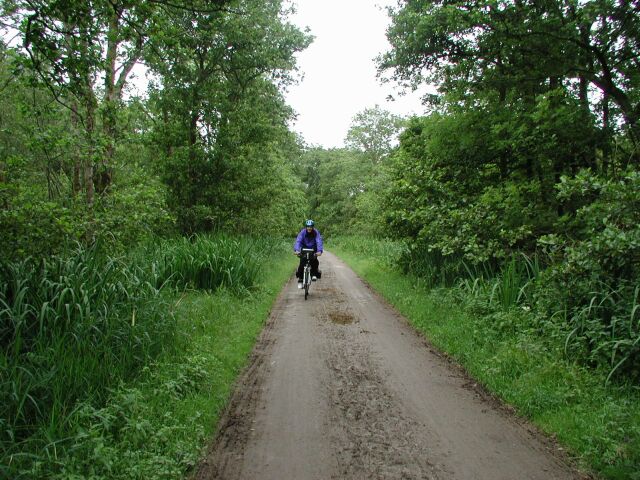
I
wasn’t sure we were headed the right way, but the biking was really pleasant
on the footpath. Vistas of the
lake and castle were on our left, and there was freshness in the moist greenery
that surrounded us. The surface
of the path was asphalt somewhere down deep, but that was well covered with
dirt, mud, and puddles.
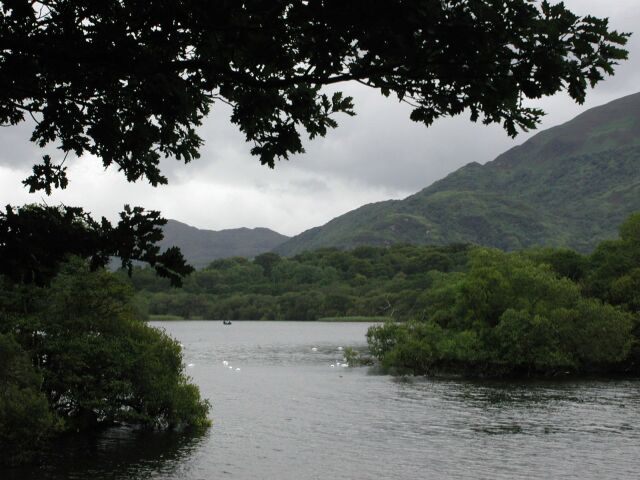
For
quite a ways we saw no walkers or other cyclists, but there were a number of
horse-drawn carriages that passed us.
Each time we would have to pull off the path and stand in the wet grass
as the carriage passed us. The
guide would be saying to the passengers in a bored voice, “And on your right
you see blankety-blank, which in 1438 was involved in such-and-such.”
We would wave to the tourists, and they often seemed more interested
in us than in the tour patter.
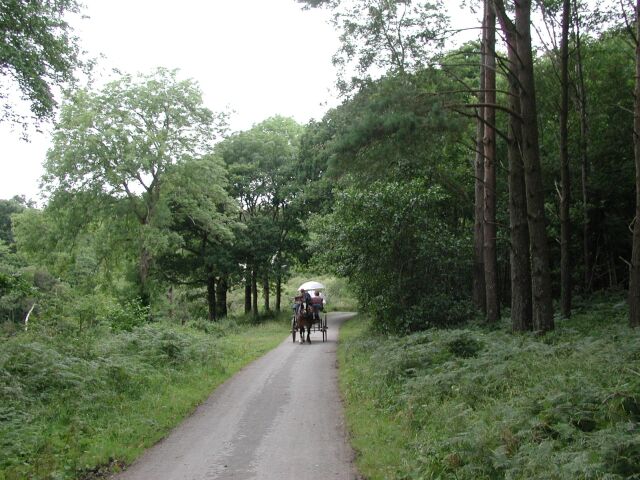
One unfortunate consequence of the carriages was that the path was often splattered with droppings. I was glad that I wasn’t riding my own road bike with the narrow tires, and I was also glad to be able to ride through the occasional cleansing puddle. But that was a minor blot on the beautiful environment that surrounded us.
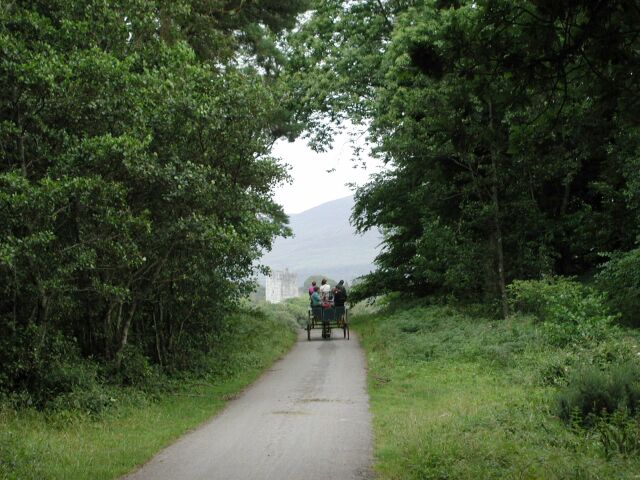
This
picture shows a view that could well have been from centuries ago – the footpath,
a horse-drawn carriage, and the castle in the distance.
It’s an idyllic scene.
After
about three miles we reached a fork where we followed the signpost back toward
Killarney, and for another mile or so we saw quite a few people walking and
pushing baby carriages. Finally
we came out of the woods at a busy road in front of a cathedral.
It was Sunday morning and the cathedral parking lot was filled.
Ordinarily I would have paid some attention to the cathedral, but I hardly
glanced at it as we took to the road out of town.
Following
Ray’s earlier directions, we negotiated two roundabouts (always a challenge
on a bike), and joined the main road out of town towards Tralee.
From there it was only about a half-mile to the turnoff for our secondary
road, but that half-mile was a rather steep hill.
I kept focusing on the approaching turnoff.
Another hundred yards, I would tell myself.
Puffing, I made the turnoff only to discover that the ensuing hill on
the secondary road was even steeper. I
gave up, feeling shamed, while Len biked ahead relentlessly.
I walked up to the top, and this is the view of the hill.
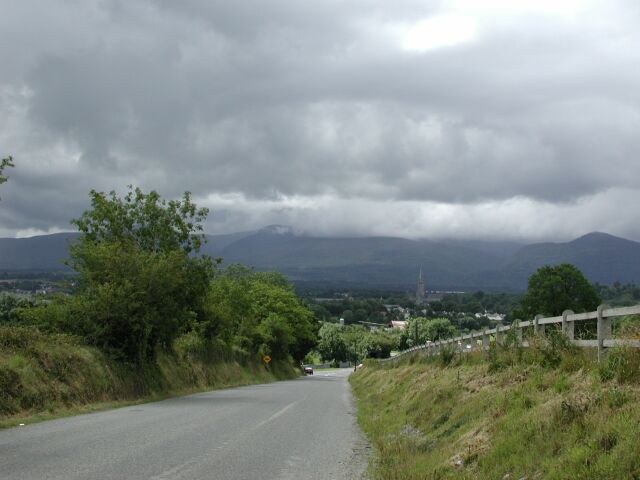
You
can just make out the steeple of the large cathedral down in Killarney.
Having reached this high point, I was relying on Ray’s assurance that
the rest of the road would be flat. The
elevation was something over 300 feet, and I watched the reading on my GPS as
we biked along the empty road. I
didn’t want the reading to go down, because that would undoubtedly mean having
to climb again. The problem with
hills to me is that the downhill goes so fast that it seems like I spend all
the time climbing.
But
Ray was wrong. As we biked towards
Tralee the road was as hilly as any we encountered on our trip.
I hadn’t anticipated this, since I lacked the detailed maps for this
area. For the most part the
hills weren’t long, but they were occasionally steep.
There was even one hill where Len had to walk, and that was the only
time on the trip that he had to dismount.
Just at the time he was beginning to wobble in his climb, a truck came
over the top towards him. Whether he would have made it or not is conjecture, but Len
felt that the truck finished him off.
There
weren’t any towns of any consequence whatsoever on this tiny road through farmland,
and moreover it was a Sunday, so getting lunch presented a problem.
We were approaching a town that at least was named on the detailed map,
but there didn’t seem to be anything there at all.
Len pulled into the driveway of a small building that didn’t look like
a store. There was no sign, and
I thought he simply needed to make an adjustment on his bike.
But it was a post office, and incredibly, it was open.
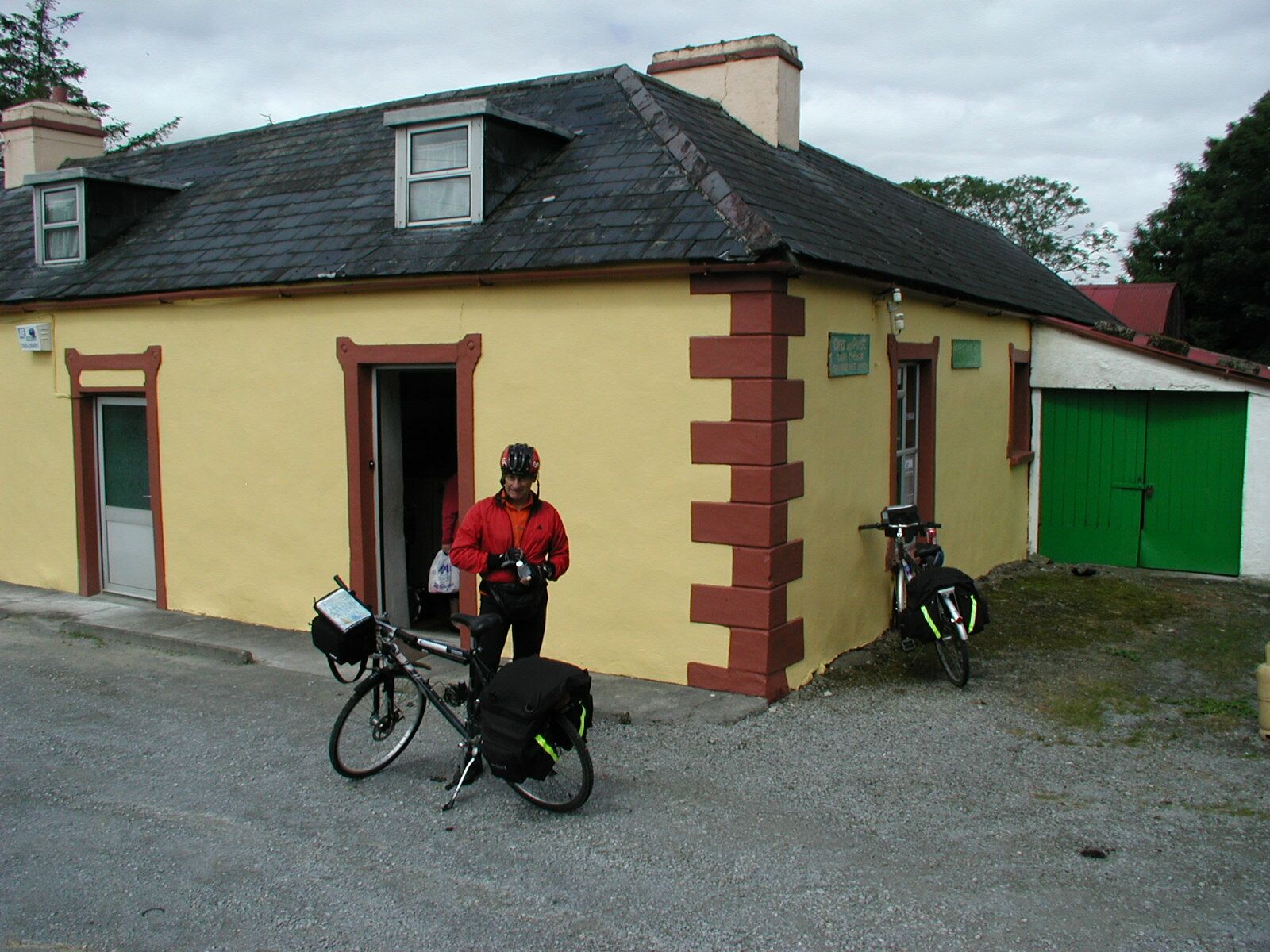
A
very old woman was behind a grubby counter in the small room.
I believe she may have been about 90 years old.
I was embarrassed to have entered, because the supplies that she had
were sadly pathetic. There were
a few candy bars, and that was about it.
Once there, however, I had to buy something, and I asked if there was
anything to drink. She motioned
towards a small, dirty refrigerator. Inside
there were three cans of Coke. I
bought one of them, and having done my duty, left.
Outside,
I worried about the woman. On the
one hand, the whole thing was so pathetic.
She couldn’t have made any money at all. On the other hand, I argued with myself that perhaps it was
better for her to have the chance to meet the occasional customer than to sit
in a rocking chair staring straight ahead all day. I just hoped that she had enough to get by.
I still worry about her.
As
usual, it was hard to find a place to pull off to eat the meager lunch that
we had accumulated. Eventually
we pulled off in front of a wall that protected one of the isolated houses,
and sat in the gravel -- hardly
an idyllic scene now. I drank my
coke, had a candy bar that I had saved, and ate a carrot and a peach from Len’s
stock. Then we were back on the
road.
Soon
afterwards, we encountered a strange sight.
There was the slow clop-clop of a donkey approaching in the other lane.
The donkey carried the panniers and provisions for what appeared to be
a backpack tour by a man and a young girl, presumably his daughter.
We stopped to take pictures and wave to them.
I wish I had asked them about their trip. I’ll bet there’s a good story there.
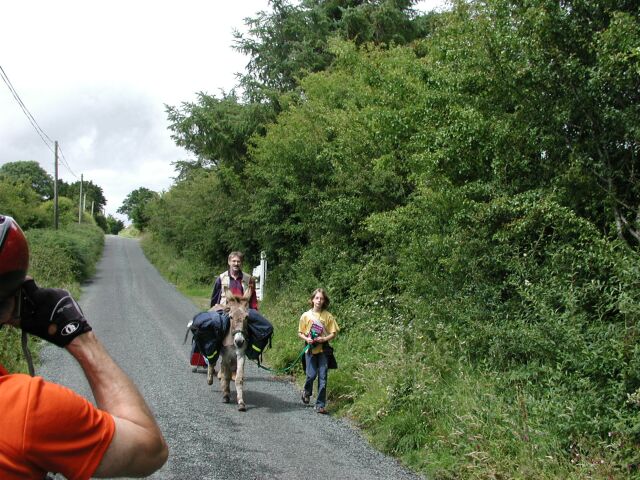
We
were at least approaching the area for which I had detailed maps.
I had planned a detour that would circumvent the large hill that had
loomed in the distance. The detour would zig-zag around the hill, adding about four
miles to our trip. As we turned
off, I recall yet another dog, guarding the house at the intersection.
This one ran after me, having been alerted by Len passing before.
As always, however, this one veered off after having proved his abilities
and bravery.
On
the way we passed many other dogs. Occasionally
Len and I would call to them and say hello.
Many of them were small dogs. They
always looked alert and protective. I
was thinking that there might have been more dogs than people in this country.
Now
we reached the zag portion of the zig-zag, and this was a prolonged hill.
I made it up as it rose from sea level to a little over 300 feet in elevation.
Somehow that doesn’t sound like much of a number, but for a comparison
that someone from my neighborhood in New Jersey would understand, Tower Hill
in Red Bank rises only 50 feet in elevation.
This hill in Ireland, which was typical of many that we faced, was six
times higher than the biggest hill in my usual neighborhood.
Still it was only half as high as the hill that the detour was avoiding.
Here I am over the top of the hill in the familiar pose of studying the
map.
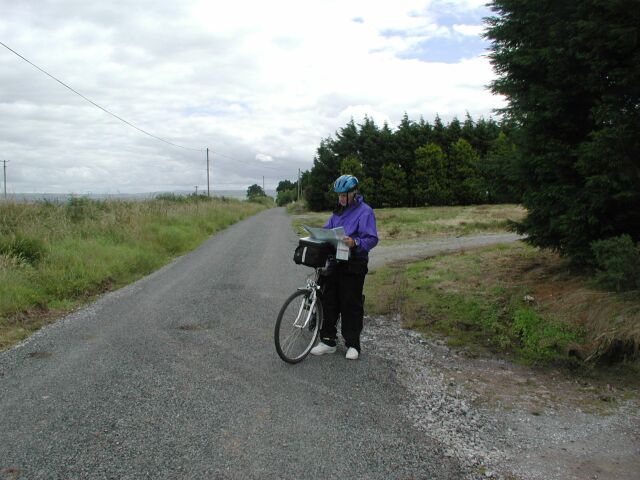
We
navigated our way into Tralee via the back roads. Len was adept at finding approaches to the towns that would
bring us directly to our hotels. He
studied the detailed map, and told me that we would be going through two major
intersections. Well, it was hard
to find the “major” intersections. They
turned out to be practically invisible dirt roads. We sometimes forgot that the detailed map was so detailed that
we could be fooled into thinking things were bigger than they were.
The
last hills on the outskirts of Tralee were very tiring, but finally we were
on a business road and immediately on our left was our hotel, the Brandon House.
We hadn’t yet seen the town of Tralee itself.
Len commented that this seemed to be a convention hotel, and apologized
for booking it. It did lack for
charm, but I was glad to get to a hot shower.
More importantly, there was a bowl of fruit in my room, and I devoured
the whole thing immediately.
We
locked our bikes in a storage building about a hundred yards from the hotel,
and I lugged my stuff back to the desk.
There was a small incident that rather typified our daily life on this
trip. We got into the elevator
to go up to our rooms on the sixth floor, but we stood perplexed in the elevator,
because the buttons only went up to five.
Len realized we were in the wrong wing of the hotel and got out.
However, the doors started to close on me.
I was holding the awkward, heavy panniers, had the handlebar bag draped
over my shoulder, and was balancing my helmet with its delicate attached mirror.
I reached to stop the closing door and everything fell in a heap on the
floor as the door shut on me. Man,
I was beat!
While
I was munching the fruit in my room I contemplated the day.
In my planning this had been one of the two easiest days.
It was relatively short – only about 27 miles – and had appeared relatively
flat. We had left Killarney early,
but spent time at Ross Castle and on the footpath.
Still, it hadn’t been late when we left Killarney, and we had hardly
stopped for lunch. Even so, it
had been 3:30pm when we had arrived at Tralee.
Where had the day gone, and why hadn’t we made better time?
I blamed this on having taken the secondary road, and also once again
regretted the lack of complete coverage in my detailed maps.
I felt that in the future we should stick more to the main roads, where
I thought we could make better time. Our
experience so far had been that there wasn’t much traffic between cities on
the main roads, and that they were straighter, better paved, and less hilly. Moreover, they went through interesting towns along the way.
In
Killarney the night before we had been left with nothing to do between dinner
and music time, so we agreed to leave the hotel later for dinner.
We met in the lobby at 7:45pm and walked down the street towards town.
It wasn’t obvious exactly where town started here as we searched for
a main street. While we walked,
Len called Stella on the cell phone and we took turns talking to her back in
Los Angeles as we searched for a restaurant.
Tralee
didn’t seem at first glance to be a particularly attractive town.
It certainly wasn’t as charming as Killarney, nor as authentically small-townish
as Macroom. This seemed more like
a working town with a dash of tourism thrown in.
Every time I thought of it, I couldn’t get “Rose of Tralee” out of my
mind. It was interesting that these
very small towns in Ireland – Killarney, Tralee, and Galway – were so celebrated
in folk songs known the world over. I
couldn’t think of an equivalent in America.
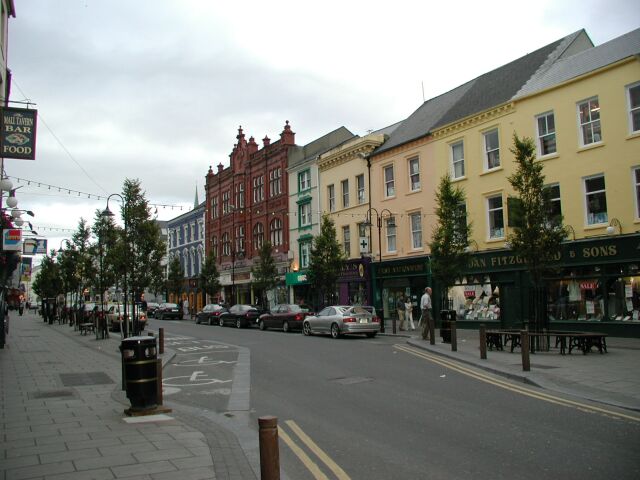
For
a few minutes we sat in a large, crowded restaurant that resembled a Denny’s,
but the menu was unappealing, and it didn’t look like we would get waited on,
so we left, and on one of the side streets we found Val’s, a bistro where we
were seated in an upstairs dining room.
We each ordered duck, and we had our now customary half-bottle of red
wine. Sometime later the waiter
apologized – there was only one duck.
Len let me have it and changed his order to something else.
Sticky toffee pudding was on the desert menu, and I couldn’t resist ordering
it. Not only had this been delicious
in Macroom, but also I loved the name.
Unfortunately, the Tralee version wasn’t as good as I had remembered.
After
dinner we went out in search of traditional music. Several passers-by told us that Og’s was the best bet, and
there we found a six-piece traditional Irish band.
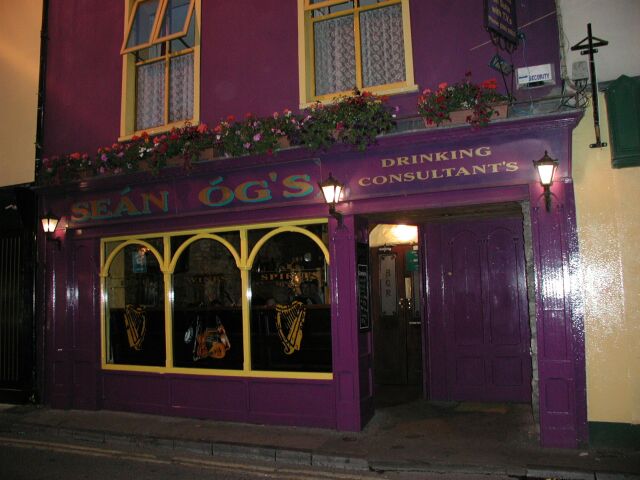
I
loved the “Drinking Consultants” over the door at Og’s.
But we weren’t crazy about the music being played.
Len and I were learning, and one thing that was slowly seeping into our
resistant minds was that “traditional” music meant instrumental music.
This was guitars, banjos, a fiddle, and sometimes a form of bagpipe where
the air pressure was supplied by squeezing the bag between the player’s upper
arm and his body. It was ok music,
but after a while it had a sameness to me. I liked it when it was a dance or jig, but more of the time
it was just, well, fiddling and plucking.
What can I say?
Len
was looking for a chance to request a song, and when the bandleader got up to
get a drink, Len approached him, asking if he could sing a ballad.
“Ah, Jesus, no!” he replied, seemingly affronted.
Afterwards, Len and I kept repeating this phrase with his note of astonishment. I think this was the moment when we decided that asking for
traditional music wasn’t the right thing for us to do in the future.
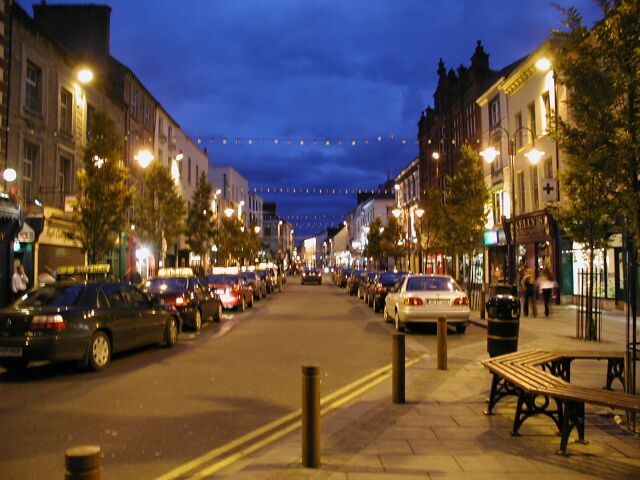
We
walked to some other pubs along the main street, but they were all rock bands.
Even though it was a Sunday night, Tralee was rocking.
Nevertheless, we decided to call it an early night.
It did me no good, however, as outside my window there was a clamor of
loud voices, which went on keeping me awake until all the hub-bub suddenly ceased
at exactly 2:00am. This same thing happened in several other towns.
It must be that the pubs close at 2:00am, but I never verified this from
personal experience.